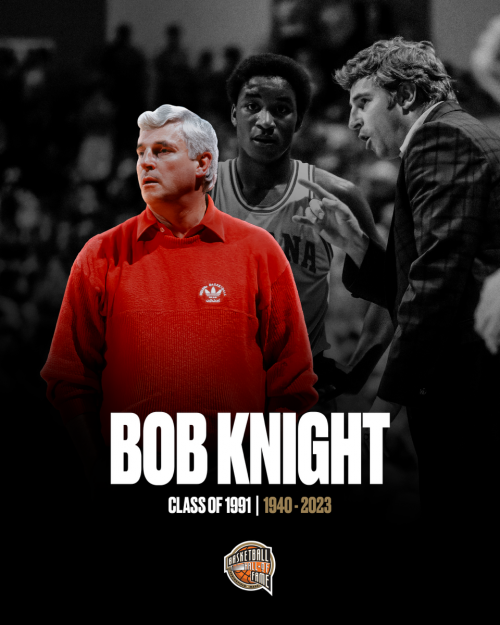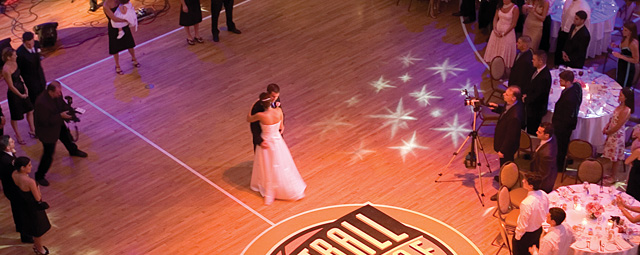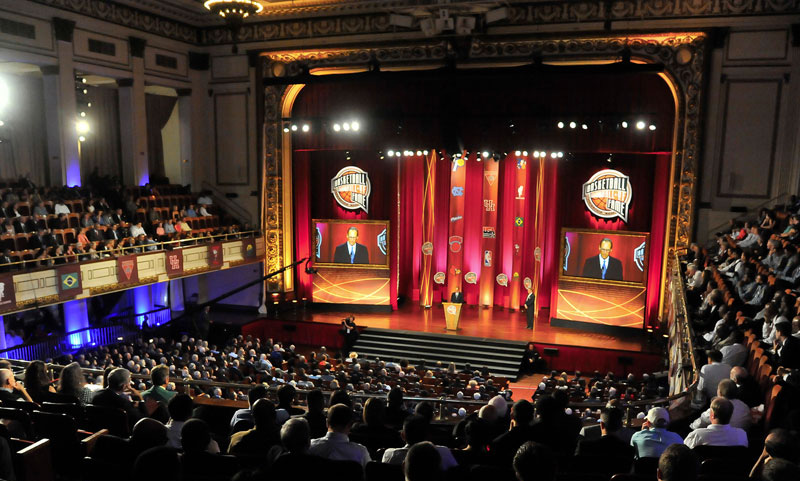In Memory
Bob Knight1940-2023Class of 1991
In the pursuit of perfection, Bob Knight wrote the book. And while he would always fall short of that noble purpose, the archetype of old-school, hard-nosed disciplinarians carved out a name for himself on the Mount Rushmore of coaches. He was a series of contradictions, fiery and intimidating one moment, warm and inviting the next, and often too stubborn to admit a wrong.
Robert Montgomery Knight passed away on November 1, 2023. He was 83. Knight won three NCAA national championships as coach of the Indiana University Hoosiers and led the United States men’s national team to gold at the 1984 Summer Olympics. His coaching career spanned five decades, a testament to the basketball genius of a coach who expected so much and gave even more.
“Bob Knight was the face of college basketball for an entire generation,” said John Doleva, President & CEO of the Naismith Basketball Hall of Fame. “His knowledge of the game of basketball was second to none. He was tough, stubborn, outspoken, and most of all, brilliant. Brilliant as a man, brilliant as a coach, and brilliant as a leader.”
Born on October 25, 1940 in Masillon, Ohio, Knight grew up in nearby Orrville where he played basketball, football, and baseball in high school. Knight later enrolled at Ohio State University where he continued to shape his basketball philosophy while playing for legendary coach Fred Taylor. During the 1959-60 season, Knight teamed with John Havlicek and Jerry Lucas to claim the first and only NCAA basketball national championship for the Buckeyes. Knight helped Ohio State win three Big Ten titles and reach three consecutive Final Fours from 1960 to 1962. He was often the first man off the bench, a role he embraced even when he felt he deserved more.
Knight began his coaching career shortly after graduating from Ohio State. In 1963, Knight accepted his first collegiate coaching position at Army where he assisted Tates Locke before being promoted to head coach in 1965. There, at West Point, he became The General. He fancied his players as troops in a well-oiled fighting machine, and all future Knight units would be tough, precise, and intelligent. He led the Black Knights to 102 wins in six seasons with four bids to the postseason NIT, including a third place finish in 1970.
In 1971, still only 31 years of age, Knight accepted a position as the head coach of the blueblood basketball program at Indiana University where he would go on to earn national acclaim. The three-time Associated Press National Coach of the Year led the Hoosiers to 11 Big Ten titles, reached five Final Fours, and won national championships in 1976, 1981, and 1987. The 1975-76 national title team went undefeated, and earned Knight the distinction of being the first person in history to win an NCAA national championship as a player and as a coach. Now nearly 50 years later, that 75-76 Hoosier team is still the last team to go undefeated in men’s college basketball for an entire season.
Knight would spend 29 seasons as the head man at Indiana University restoring a once proud program to its former glory. He embedded himself in Hoosier Hysteria, compiling 661 of his 902 career wins in Bloomington before leaving under a cloud of smoke and eventually landing at Texas Tech. Knight’s motion offense kept opponents on their heels while his stifling man-to-man defense meant contesting every shot, disrupting the passing lanes, and providing help-side defense at all times. While not without controversy, his good qualities far outweighed his missteps. He stressed discipline, attention to detail, and focus, even when he lost his. He instilled in his players the absolute will to win. Or in Knight speak, “the will to prepare to win.”
Knight was a student of the game, forever seeking out the basketball advice columns and life lessons of coaches like Joe Lapchick, Clair Bee, Pete Newell, and Hank Iba. Knight planted the seeds for future frontmen including Steve Alford, Isiah Thomas, Mike Woodson, Lawrence Frank, Mike Davis, Don DeVoe, Jim Crews, his son Pat, and the man who would ultimately break Knight’s record for career wins, Mike Krzyzewski.
Bob Knight was inducted into the Naismith Memorial Basketball Hall of Fame with the Class of 1991.




